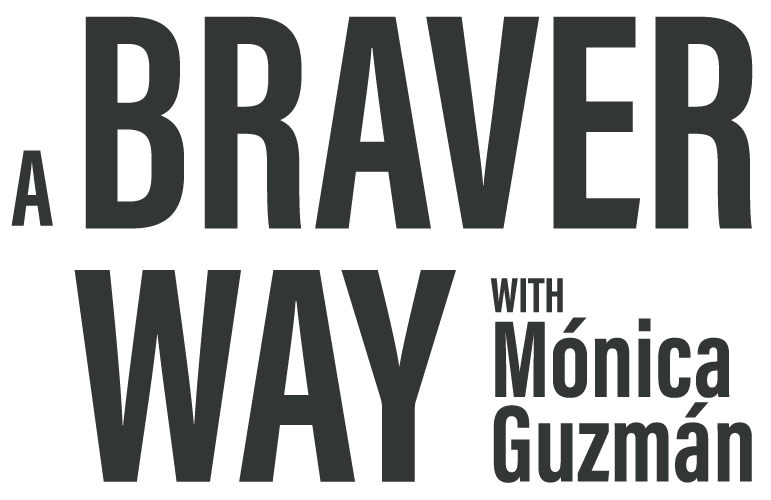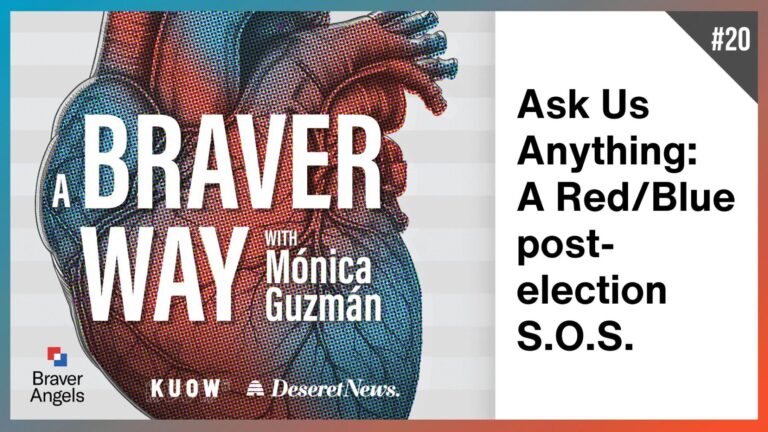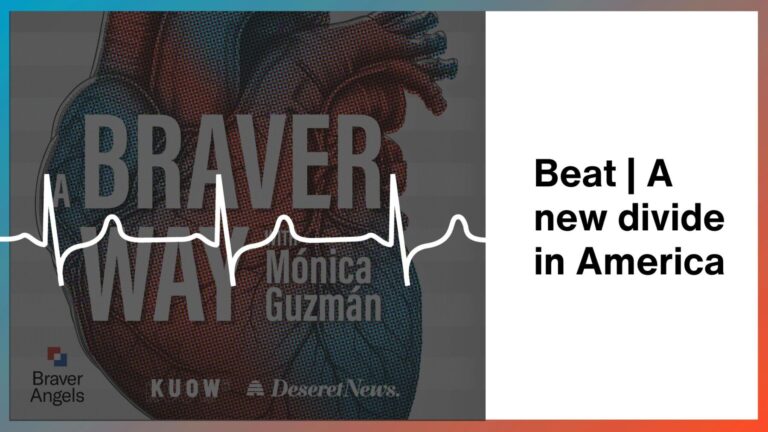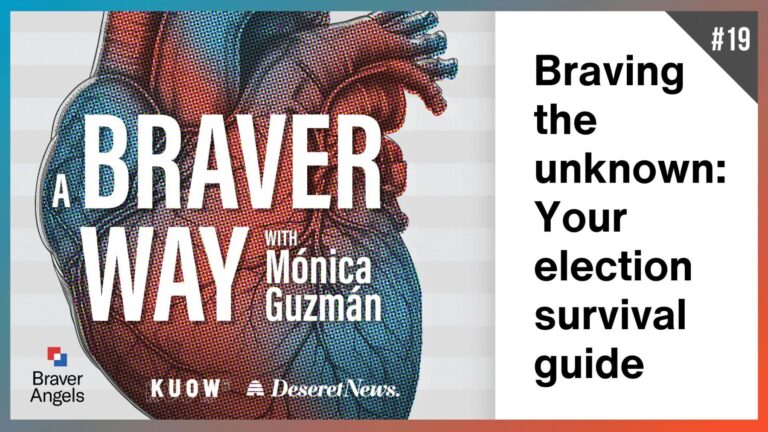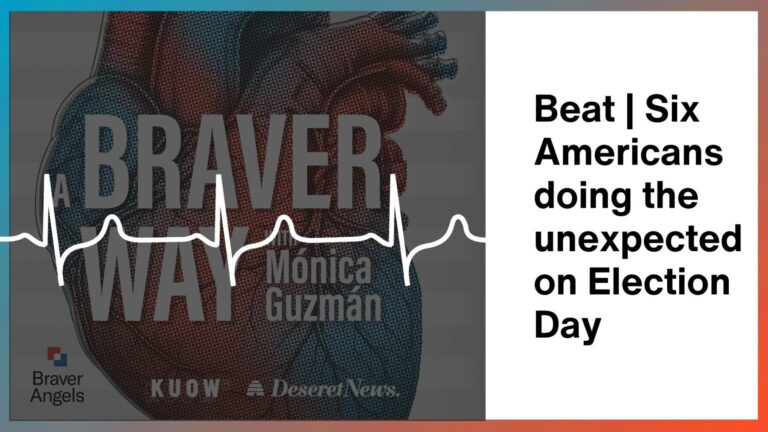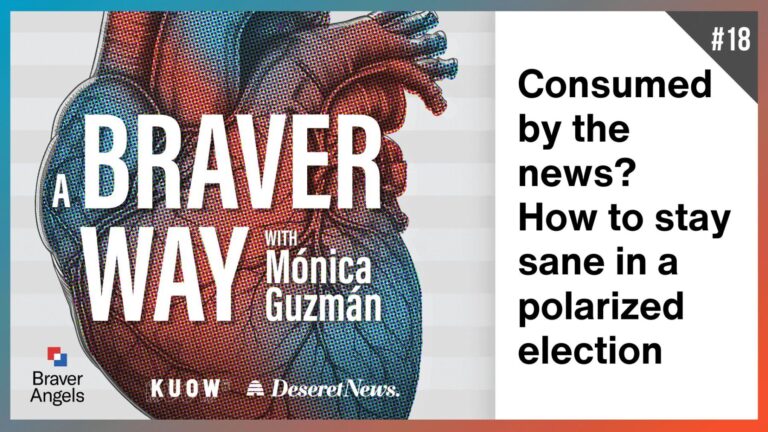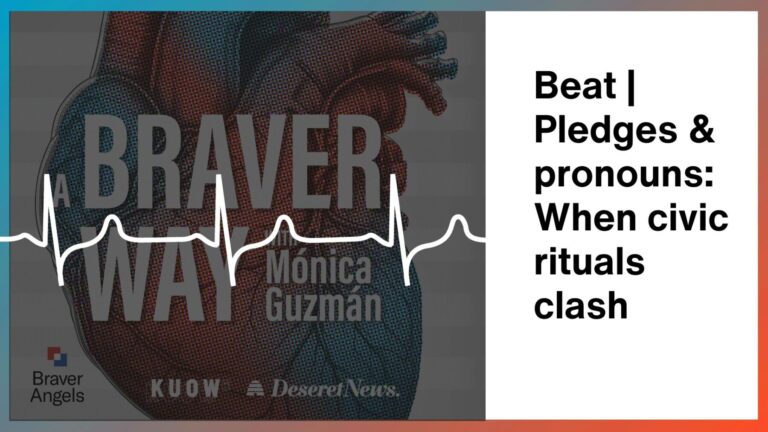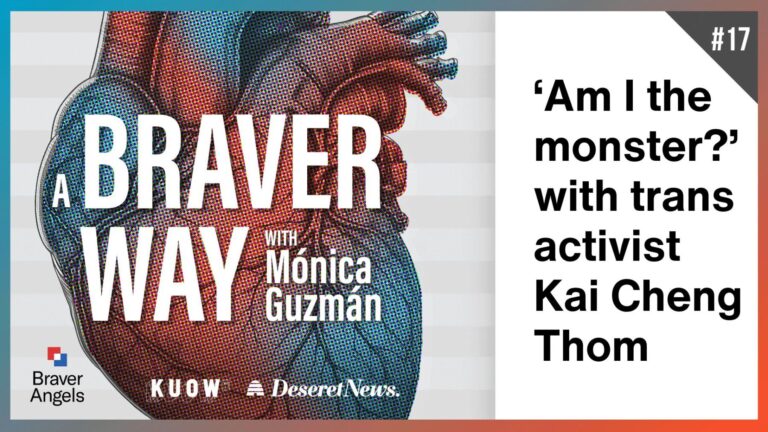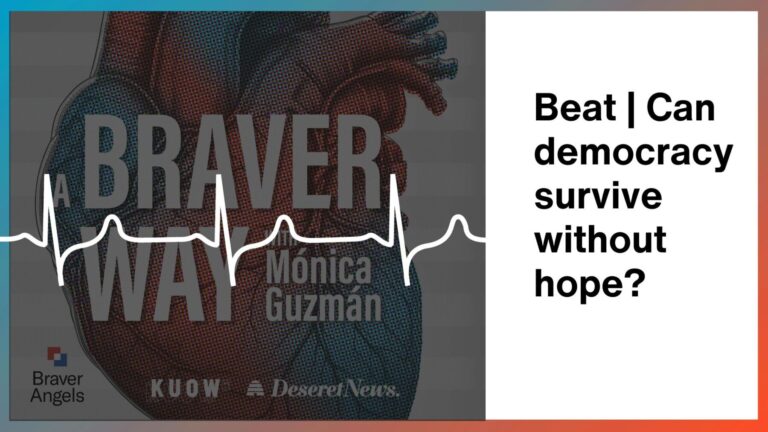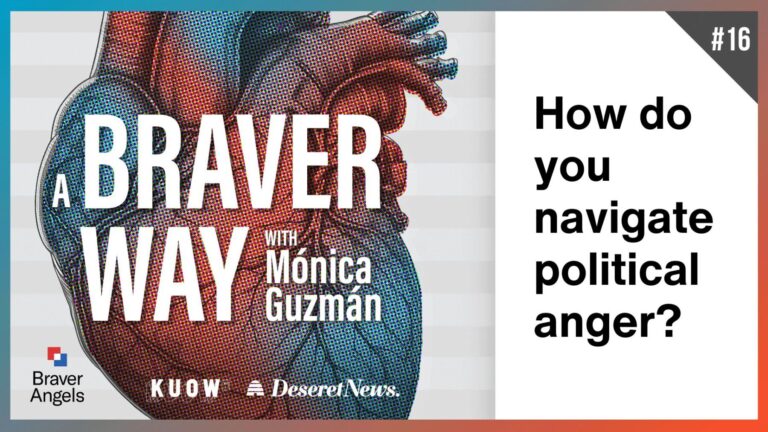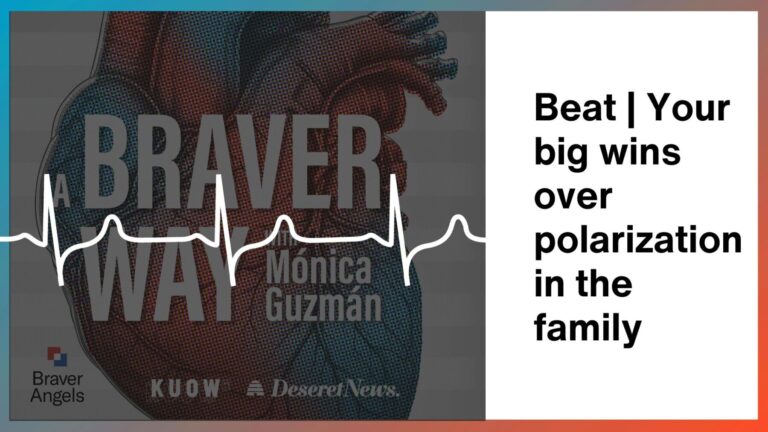Say hello to David Kaufman, a conservative from South Carolina who’s made a serious habit of talking politics with liberals — with both sides learning loads as a result. Then join us in celebrating some of the people in YOUR lives who make tough disagreements worth having.
Host: Mónica Guzmán
Senior Producer & Editor: David Albright
Producer: Jessica Jones
Artist in Residence: Gangstagrass
Cover Art & Graphics: Katelin Annes
A production of Braver Angels.
Financial Supporters: M.J. Murdock Charitable Trust and Reclaim Curiosity
Sponsors: USAFacts
Media Partners: KUOW and Deseret News
Submit a question: If you’ve found yourself mulling on a concern or reflection as you’ve listened, turn it into a question and share it with us in a quick email to abraverway@braverangels.org.
Subscribe: If you like what you’ve heard, hit subscribe, and leave us a 5 star review!
Share this episode: https://braverangels.org/a-braver-way-beat-episode-5/
Follow us: Instagram | X/ twitter | TikTok | Youtube
Join our text line: Text “brave” to 206-926-9955 to join
Join Braver Angels: Become a Braver Angels member
Set up a 1:1 conversation across the divide: https://braverangels.org/online/1-1-conversations/
This season, we are proud to be partnering with two fantastic media organizations to help us reach more listeners like you. KUOW is Seattle’s NPR News station, and Deseret News is a multi -platform newspaper out of Salt Lake City. Help us by helping them. Learn how at KUOW.org/brave or Deseret.com/subscribe.
Moni Intro-
(music up)
Hi all. It’s Mónica, cutting in through the political noise out there on your feeds, and group texts, and headlines, to get right to the heart of this week’s beat: the simple power of one conversation with one other person.
David Kaufman:
It is hopeful to see how much we have and overlap for our mutual concerns and interest and it gets me out of my comfort zone and echo chamber.
Mónica Guzmán:
The voice you just heard belongs to a man named David Kaufman. Over the last few years, David has made something of a habit of having one-on-one conversations with people he used to think he had very little in common with… liberals.
I met David when he sat down with yet another liberal — me — on a bench outside the Braver Angels National Convention in Wisconsin this June. We got to talking about the sunny weather, his 20 years as a Navy fighter pilot, and… a national program that pairs everyday folks from the left and the right for guided cross-partisan conversations.
Hundreds of, conservatives, independents and liberals have had more than 2,000 of these one-to-one conversations through this program since 2020.
But no one has had more of them, I learned, than David.
Now, I know from research going back years that getting to know someone from the “other side” of any tough divide helps correct the stereotypes that tend to crop up around it. One study found that interacting face-to-face with someone in your “outgroup” reduces prejudice 94 percent of the time.
But, still, it’s hardly a popular choice these days. Especially across the political divide, of all things. So as soon as I heard that David was bucking expectations to this degree, I had to know: What motivated him to not just not avoid his political outgroup in the most toxically polarized years in recent memory, but want to have a chat with them, about their politics, over and over again for years?
And what do you learn doing something as unexpected as that in a moment like this?
Here’s David, in his own words…
David:
My name is David Kaufman. I’m from Charleston, South Carolina, and I lean conservative. Growing up in the southeast U. S., it tends to be more conservative, so that was where. I got my conservative leaning.
My neighbors, my dear neighbors, were lean liberal. And we never really seemed to be able to engage on any political discussions. We would dance around, but we really never engaged, so I was looking for a method to be able to talk to them and really understand what they were looking, because they were very hard liberal, and we never talk about it, they invited us over to their party for the 2016 election, and we were the only conservatives there. When the results were announced, you could have heard a pin drop, and that’s when they looked at me and my wife and said, okay, I think it’s maybe time for us to leave. We just quietly bowed out.
Another example is my brother in law. He is from the state of Illinois.
If you look at the state of Illinois, the entire state is red, except for Chicago and Springfield, which are the two population centers, He lives in a small part of the cut, small town. He wants nothing more to raise his family, pay his taxes, and enjoy his life, and he hates Democrats.
And he said, I don’t even want a Democrat in my house. The first time I approached him about that, I got a pretty negative reaction, and I said, what good does that do? How does that help anything if you’re refusing to talk to people on the other side?
This, the whole country’s built on compromise, and kicking them out of your house ain’t the way to, ain’t the way to compromise.
So, David could sense the political divide, creating real divides in his own life. With his liberal neighbors who were his opposite politically. And even with his brother-in-law. Who he mostly agreed with on politics. That’s when he found an outlet. A program that connects people of different politics together. For one-on-one conversations.
David:
It started out with, a retired software engineer in Boston. We were really far apart on most things, and what really struck me is I think it was on our second or third conversation she was, I like talking to you, and I said she was, it gives me hope. It gives me hope to see that we have such a large overlap in our concerns about the country.
Mónica:
David got so much from these conversations, he found himself signing up for them again and again, connecting with more and more liberals all across the country, including one person, who he’s talked to more than 50 times and counting.
David:
We actually kept track of all of our topics, and most of them were the hot button issues of the week or month that we had talked about. Black Lives Matter, Ukraine. We have had, we just finished up our 54th conversation. We’ve been talking for three years now, and it’s just nice to hear because it’s like I need a liberal perspective on this and we’ll have a conversation. She needs a conservative conversation on this, and we’ll have a conversation.
Mónica:
Part of why he does all this, David says, is because he finds it endlessly fascinating that people from different parts of the country can look at the same issue so differently based on their background, their upbringing, and the conclusions that life has led them to.
David:
They honestly believe that this is the way things should be if they never get out of that little bubble. So once you get into that bubble, they get into your bubble, then it’s kind of like, wow, there’s a little bit more out here than I thought. I can’t say that I’ve ever changed anybody’s mind on things, but I think I have influenced some of their perspectives on issues of the day.
Mónica:
David points to one issue in particular that he’s had some tough and honest conversations around.
David:
One of the things that I hear about is the income disparity between the races. And the label’s been laid on systemic racism. It’s a big problem. It’s a big problem. And the point I try to bring up is that it is a problem, but you need to keep in mind that we are making progress on it. And I’m dating myself a little bit here, but in the 11th grade, I was in the first year of forced integration in the state of Alabama.
And it was not a pretty sight. It needed to be done. Nobody liked it. But it was done. And I try to give that as a frame of reference at, look how far we have come since then. Look how far we have come. We have made a tremendous amount of progress. And that seems to calm the waves just a little bit to look from then and now and say, yes, it’s still an issue, but, and we’re working on it.
Monica:
But the perspective sharing doesn’t go in just one direction. Oh, no. That is not how good conversations tend to work.
David:
She went to great lengths to get me to understand how the income gap today, one of the contributing factors to this, was the habit of redlining. In other words, there was a practice where a line was drawn on a map and minorities were not allowed to own property or live there.
And the second was the preferential loan mortgage practices back in the late 50s. I had never been exposed to that. I don’t look at the… I look at the liberals as people with different political beliefs. I don’t try to label them as bad people. I don’t try to label them as somebody that’s difficult to work with.
I just label them as somebody with different political beliefs and that I need to understand those beliefs. Before, I could care less. I know what I know and I know I’m right. Well, guess what? I ain’t right all the time. What I would like to suggest is to talk.
Talk and learn about people, understand their beliefs. It may be difficult at times. You may hear things that you don’t want to hear. But for our country to move forward, we need to learn to respect one another’s opinion and learn to compromise
Mónica:
And what about that brother -in -law who didn’t even want to let a Democrat into his house?
David:
He thinks I’m wonderful. He thinks I’m really brave for engaging the other side. He doesn’t know how I have the patience to do so. And once he sees what I do, and my wife overhears many of our conversation and she shares that with him.
And he realizes, I think, that yeah, we need to start understanding and talking more.
(music up and under)
Mónica:
I didn’t doubt for one moment after meeting David that he is exactly what his brother-in-law pegs him to be around all this: Brave.
And I know a lot of people who think that they’re not, that they could never find the patience for honest conversations across the divide, the confidence, the curiosity. It isn’t always easy, we know that.
(music out)
Sometimes it’s really painful. But it can be rewarding and illuminating and stereotype crushing and prejudice -reducing.
It can get us closer to something real that all that political noise out there is hiding. But here’s another thing that’s getting lost in the chaos. Worthwhile chats about politics to people with different politics are not as rare as we think. They happen every single day all across the country. They’re just barely noticed, rarely celebrated, even though they’re the antidote to so much of what we all agree.
We can’t stand. So, we’re going to celebrate those conversations right here, right now on this podcast, the cross-partisan exchanges you dare to have and end up genuinely grateful for.
Last week, I asked you via our text line, to share the name of someone in your life you’ve had a productive political disagreement with so we could shout them out this episode.
And you oh so kindly obliged. So, without further ado,
(music under)
Harriet, who’s blue, shouts out Jay in Colorado, who’s red, thank you for the conversations.
Mitch, who’s red, shouts out Samantha in Texas, who’s blue, and writes, “she’s my sister -in -law and came out as bisexual in college. She came to visit recently in Idaho, and we had a great conversation where I was able to understand her thinking and choices from her own frame of reference. Kudos to Samantha. “
Glenn, who’s purple, shouts out not one but three good folks in his life to disagree with.
Curtis in Texas, Carolyn in Minnesota, and Craig in Nevada. Thank you all.
Michael, who’s blue shouts out Rick in Minnesota, who’s red, and writes,
“Rick and I have been in conversation for two years. He is very bright and articulate. Although we don’t agree on many issues, I have a tremendous amount of respect for him.” Thank you, Rick.
Rita, who’s red in Arkansas, shouts out a man named Charles for a civil and curious conversation they had in the comments of a popular Substack, a fun little twist. She guesses that Charles is conservative, like her, or maybe independent, but she could tell from his posts, she said, that he is, quote, definitely not a fan of Trump.
The internet is tough terrain for these conversations, Charles. Thank you for stepping up.
Mike, who’s blue, shouts out Tim in California, who’s independent, for a constructive conversation on, quote, deep differences. He wrote DEEP in all caps, by the way. Thank you, Mike. You’re making a difference.
Emily, who’s independent, shouts out Jesse in Michigan and goes way back for this one.
She writes, “Back in middle school, we debated politics and religion and culture almost every day. Our discussions were unrefined. We were 12, but it was great practice for respectful disagreement while remaining friends.”
Talk about leaving a mark. Thank you, Jesse.
And here’s a particularly sweet one to close us out from Mark to Diantha in Colorado. He writes, “She is my beautiful wife and she is blue.I lean very red. She is so patient with me. “
Cheers, Diantha. And you too, Mark. Keep going.
To everyone else who’s ever crossed the political divide and brought back something new and good. you’re modeling something really important.
Tell your friends, your relatives, if you can bring down the fear, others can turn up their courage. Speaking of which…
(music change and under)
If this episode is making you want to try that program that David Kaufman was talking about, a Braver Angels’ one-to-one conversation across the political divide, find the link in our show notes and check it out.
(music change, up and under)
And with that, thank you all so much for joining us for this beat episode of “A Braver Way.” A Braver Way is produced by Braver Angels and distributed in partnership with KUOW and Deseret News.
We get financial support from the MJ Murdoch Charitable Trust and reclaim curiosity and count USA Facts as a proud sponsor.
Our senior producer and editor is David Albright. Our producer is Jessica Jones. Our theme music is by the fantastic number one Billboard bluegrass charting hip hop band Gangstagrass.
A special thank you to Ben Caron, Don Goldberg, Gabbi Timmis, and Katelin Annis. I’m your host and guide across the divide, Mónica Guzmán. Want to share your thoughts or story with us? You can always reach us at abraverway@braverangels.org or join our text line by texting the word BRAVE to 206-926-9955.
Take heart, everyone. ‘Til next time.
Braver Angels is the nation’s largest cross-partisan volunteer-led movement to bridge the political divide and the organization that produces this podcast.
And here’s the exciting part. You can join us in our mission to overcome toxic polarization and strengthen our Democratic Republic. Head to braverangels.org /join to become a member and support our growing movement. And let them know “A Braver Way” sent you.
(music out)
